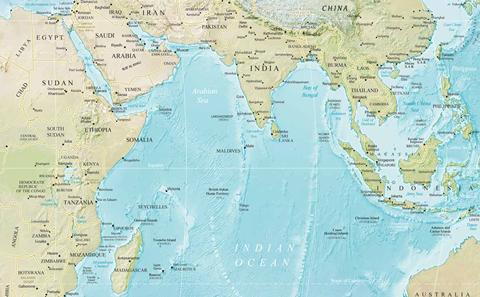SMMI Indian Ocean Workshop Event

For more information regarding this event, please email Sue Smith at s.b.smith@soton.ac.uk .
Event details
SMMI plans to host a number of informal workshops to better understand our research and other activities in a number of important geographic regions. The first event will focus on the Indian Ocean and its surrounding countries.
Objectives of the workshop
The objectives of this event are: (i) to gain better community knowledge of our research interests and activities from an Indian Ocean regional perspective; (ii) to pool our knowledge of trusted partner organisations, NGOs, institutions and individuals in the Indian Ocean region and its hinterland, who will be essential for successful GCRF, Newton Fund and similar proposals; and (iii) to build new connections across disciplines, campuses and faculties to help improve research outcomes and funding applications.
There will be a selection of short talks, opportunities to make quick 1-slide/3 minute pitches about your particular research interests, skills or techniques, poster opportunities, round-table discussions, and a drinks reception. Although sponsored by the SMMI, potential research interests do not need to be directly linked to marine or maritime and can include all aspects of scholarship including culture, society, health, science, business, engineering, economics, medicine, and law. We especially want to attract researchers with relevant experience and expertise to major societal challenges, but who are NOT presently working in the wider Indian Ocean region.
We seek short statements of interest, abstracts, posters, 1-slide pitches, and other contributions such as lists of colleagues, and agencies with whom University of Southampton researchers have personal contacts.
Draft Outline of Event:
| 1300-1320 | Arrival and Registration |
| 1320-1330 | Welcome and background briefing (Prof Ajit Shenoi, Prof Damon Teagle, Prof Mikis Tsimplis) |
| 1330-1430 | Challenges and Opportunities in the Indian Ocean Region (Short Talks) |
| 1330 | Prof Colin Grant (VP International) - The University of Southampton International Strategy for the Indian Ocean Region |
| 1340 | Prof Bob Marsh – An oceanographic perspective of the Monsoons |
| 1350 | Prof Jadu Dash – Sustainable water and food security across sub-Saharan Africa |
| 1400 | Dr Cecilia D’Angelo – Coral Reefs and Environmental Stress |
| 1410 | Dr Val Byfield – Sustainable Seas, Livelihoods and Food Security in the Western Indian Ocean |
| 1420 | Prof David Owen – Between Expatriates and Residents: Seafaring Citizens and Development in the Indian Ocean Region |
| 1430 | Dr Stephanie Jones – Somali Pirates in the Global Imagination |
| 1440-1500 | Refreshments and opportunities to inspect posters/networking |
| 1500-1600 | Short pitches (3 minutes) – 1 slide on expertise/interest/idea |
| Summary and Collation of Interests/Expertise | |
| 1600-1645 | Round table discussion of pooled ideas/poster inspections (what additional expertise/contacts required) |
| 1645-1715 | Reporting of round table discussions |
| 1715-1800 | Next steps and closure (Prof Ajit Shenoi, Prof Damon Teagle, Prof Mikis Tsimplis); Networking Reception |
If you would like to attend please register through Eventbrite below and if you wish to contribute to this meeting then please indicate your interest with the Southampton Marine and Maritime Institute via the SMMI Co-ordinator, Mrs Sue Smith (s.b.smith@soton.ac.uk).
Background brief
SMMI plans to host a number of informal workshops to better understand our research and other activities in a number of important geographic regions. The first event will focus on the Indian Ocean and its surrounding countries.
The Indian Ocean is Earth’s third largest ocean and is surrounded by and includes more than 40 nations and dependencies. These countries are home to more than 2.5 billion people, whose lives range from a few of the most prosperous to many of the world’s poorest and most disadvantaged populations. Almost 30 countries from the Indian Ocean region are on the OECD Development Assistance Committee (DAC) list including a dozen Least Developed Countries. Other land-locked countries, such as Afghanistan, Ethiopia, South Sudan, or Malawi, look towards the Indian Ocean, and face major societal, political, and environmental challenges.
The Indian Ocean hosts unique and threatened ecosystems, and plays a critical role in Earth’s climate, in particular the monsoons; the nature and timing of which affect billions of people on seasonal to decadal timescales. Despite the challenges in the region, the Indian Ocean and its neighbouring seas, carry half of the world's container ships, one third of the world's bulk cargo traffic, and two thirds of global oil shipments. Safe passage of seaborne-trade is critical to the world economy, but ships must pass through a number of strategic choke-points including the Straits of Hormuz and Malacca, the Red Sea-Suez Canal and the Cape of Good Hope.
This workshop will bring together researchers with on-going and potential future projects in the wider Indian Ocean Region for open discussions and networking. We especially want to attract researchers with relevant experience and expertise to major societal challenges, who are NOT presently working in the wider Indian Ocean region. Although sponsored by the SMMI, potential research interests do not need to be directly linked to the marine or maritime and can include all aspects of scholarship from culture, society, science, engineering, economics, medicine, law.
Our intention is to pull together information on research projects, research skills, and contacts with local, national and regional governments, industries, and NGOs. We aspire to develop better knowledge of research and educational links, alumni, and researchers’ future aspirations to facilitate the development of future research and the proposals to the Global Challenges Research Fund, Newton Fund as well as to other national and international agencies.
In future and learning from the successes of this meeting the SMMI plans to host regular regional events on the Caribbean and South America, East Asia, the Western Pacific and Oceania, and the Arctic.